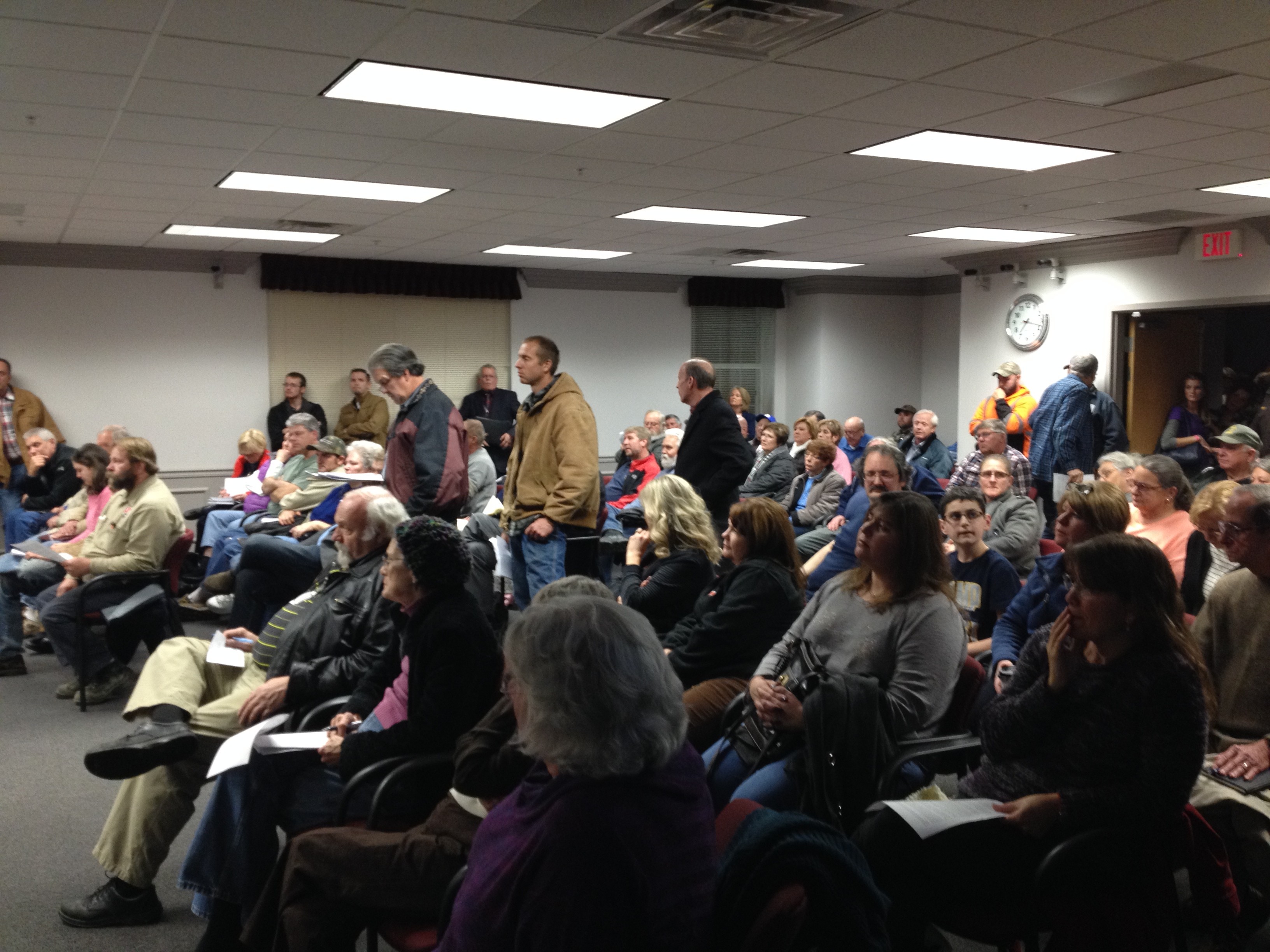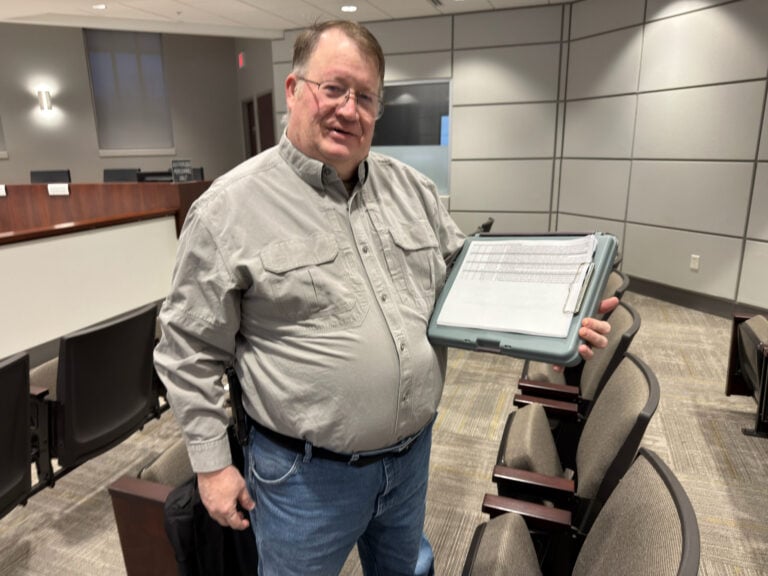By Mark Hansel
NKyTribune managing editor
If the Boone County Fiscal Court approves a new code enforcement ordinance, it appears it will be very different than the draft version that has many residents up in arms.
The Fiscal Court postponed a second reading on the proposed ordinance Tuesday after receiving negative feedback from community members concerned that it was overreaching.

The fiscal court chambers were not large enough to hold the throng of residents that showed up at Tuesday’s meeting to voice opposition to the proposed ordinance. A crowd of more than 300 people lined the walls of the courtroom and crammed into the outside foyer.
“We are going to defer the reading because we are not going to vote on it tonight,” Boone County Judge-executive Gary Moore said. “I’m glad you’re here because we want to hear your input. This is still an ongoing process (and) the fact that we are not reading it and not voting on it doesn’t mean it’s totally dead.”
The throng at Tuesday’s meeting stirred memories of the parks tax ballot initiative that was soundly defeated in 2008, when residents also filled the fiscal court chambers. That issue created a deep divide among county residents and nearly resulted in Moore’s defeat in the 2010 Republican judge-executive primary.
While this issue is not expected to have that kind of impact, a significant number of those on hand were strongly opposed to the ordinance in its current form.
The ordinance, if approved, would allow for the creation of a property maintenance code for the unincorporated areas of Boone County. It would also allow for the creation of an administrative board with the authority to issue remedial orders and impose fines to ensure compliance with the ordinances in force.

Moore said the Fiscal Court would likely bring the ordinance up for a vote in February, after revisions based on community feedback are made.
While a code enforcement board is not uncommon (Kenton County and Campbell County each have one), the demographics of Boone County make an ordinance that is applied uniformly to all residents in unincorporated areas challenging.
Boone County has just three cities, Florence, Union and Walton.
More than 80,000 of its estimated 124,000 residents live in the unincorporated areas. This includes the upscale communities of Oakbrook and Triple Crown, and the rural settings of Petersburg and Rabbit Hash, as well as Hebron, which has a mix of residential, commercial and retail properties.
Applying the same rules to a property owner in Rabbit Hash to the owner of a high-end home in Triple Crown may seem impractical, but the county, by law, is prohibited from having separate property maintenance codes for residential and rural areas.
That prompted many at the meeting to question the need for a property maintenance code that will be difficult to fairly draft or enforce. A similar ordinance introduced in 2009 failed to gain approval from the fiscal court.
Assistant Boone County Administrator Matthew Webster said the ordinance was drafted in response to a large number of calls for service from members of the community.
From the beginning of 2007 through October 2015, the count received 6,658 calls for assistance in the code enforcement department. Between 2012 and 2014, the county also received 243 zoning complaints.

“There are provisions that specifically address discarded items and vegetation, but there were none that really addressed basic care and upkeep of property, or that dealt effectively with safety issues,” Webster said. “In giving our report, we shared that the time may be right to establish some basic minimal standards to ensure that the county does not become blighted.”
Many of those in attendance believe the standards identified in the 40-page ordinance, in its current form, are not minimal, and do not adequately take into consideration, the diverse makeup of Boone County. Some at the meeting expressed concerns that the ordinance was crafted to accommodate more affluent residents in newer communities at the expense of those in neighborhoods with older homes and businesses.
Michael Butler of Walton, a fourth-generation resident, said he never considered leaving until he read the ordinance.
“Ordinance 15 is nearly impossible to perfectly obey, it’s going to drive away residents…it’s not going to solve the problem of complaints (and) it’s going to cost Boone County money,” Butler said.
He pointed to examples, including a requirement to have a house number properly displayed on a home or on the street curb, in front of a home, as violations of the code that are unfair to some residents.
“Each of these literally thousands of ways, can earn you a…fine,” Butler said. “These violations are not all as well defined as the house-number example. Most of them will be determined by whichever Boone County employee next visits you.”
Fines would range from $30 for a first offense to as much as $2,000 for repeat offenders for each violation.
A provision that would exempt property owners of more than 10 acres was designed to make allowances for farmers, but some in the audience who have smaller lots feel they should be entitled to the same consideration. Moore said that clause is among those that would be revisited and anyone who files a Schedule F (farm) tax form would also qualify for the exemptions.
Not everyone who spoke was opposed to the ordinance and even some of those who have concerns about it in its current form agreed that there might be a need for stricter regulations.
Linda Whittenburg of Hebron has two businesses in Burlington and said the lack of a property maintenance ordinance has had a negative impact on her business at times.
“Our businesses are our livelihood and we take much pride in them as we do our home,” Whittenburg said. “The old saying ‘you can only make one first impression’ is so very true when it comes to your business. Because of our pride in our properties, we have many times been forced to try to remedy some very difficult situations concerning neighbors and their lack of respect and maintenance of adjoining properties.”
Whittenburg praised the code enforcement department for its attempts to assist with those issues, but said more oversight is needed.
“There is such a lack of an organized board and written enforcement rules and penalties that often their hands are tied,” Whittenburg said. “When it comes to property rights, my feeling is it is our right to be able to live and operate businesses in a safe environment.”
The ordinance would require approval from three of the four members of the fiscal court. Commissioner Charlie Walton said after the meeting that he thinks there are a lot of concerns that need to be addressed before the ordinance is put to a vote.
“One of the question is what percentage of residents are really filing complaints. Even with 6,000 complaints over 10 years, that’s only 600 people a year and many of them file more than one complaint,” Walton said. “We can help people and take care of many of these issues by working together with churches, neighbors and communities. I’m very hesitant about more enforcement and regulation because we have seen what can happen with that on the local, federal and state level.”
Moore said there are some misconceptions about the proposed ordinance and emphasized that code enforcement officials would not be allowed to enter property without permission of a property owner or a court order.

He said those in attendance provided valuable input. He agreed that a suggestion to form a committee of community members to provide input before the ordinance is presented again could help clear up some of the concerns.
“I was so thankful that we had a large turnout tonight and so many good comments and the finished product will be better because of the process,” Moore said. “We have a problem to address and most of the people here agreed that there is an issue and it’s really more how you go about addressing that issue. I’m confident that if the concerns are dealt with, we will be able to come to something that a majority of the fiscal court will pass.”
Some of the violations identified in the proposed ordinance, which would be complaint driven, are already on the books in Boone County. The ordinance would allow residents a remedy beyond an appeal to district court, which is the only option currently offered to those who disagree with a code enforcement decision.
In its current form, the ordinance indicates that once a complaint is filed, it will be investigated by code enforcement. If it is determined that a violation exists, a notice is sent to the property owner explaining the offense and offering a remedy. If the issue is resolved there is no further action and if a property owner needs assistance, code enforcement will attempt to provide it.
If a violation is not remedied within a designated time frame, a citation is issued. Property owners can appeal to the code enforcement board and if ultimately the issue is not resolved to their satisfaction, can still file a complaint in district court.
Contact Mark Hansel at mark.hansel@nkytrib.com

















